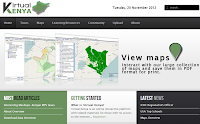Africa: more Africans should blog on Wildlife and Environmental issues.......
As it is, very few Africans blog and make their voices heard. For Africans who take up blogging, very, very few, if any, write about wildlife and the environment. Africa, with the largest, most diverse, most wonderful and most spectacular population of wildlife, has a people who are least interested in it. Be it in: its oceans, its islands, its plains, its jungles - Africa is abundant with wildlife. Plants and animals. Of many species, of many shapes and of many sizes. One can not talk of wildlife, without thinking of the environment. The environment that all wildlife lives in and depends on. And so do we mankind. All living creatures, all life forms are very dependent on the environment they live in. So why don't African bloggers write about these most important of issues: wildlife and the environment?




